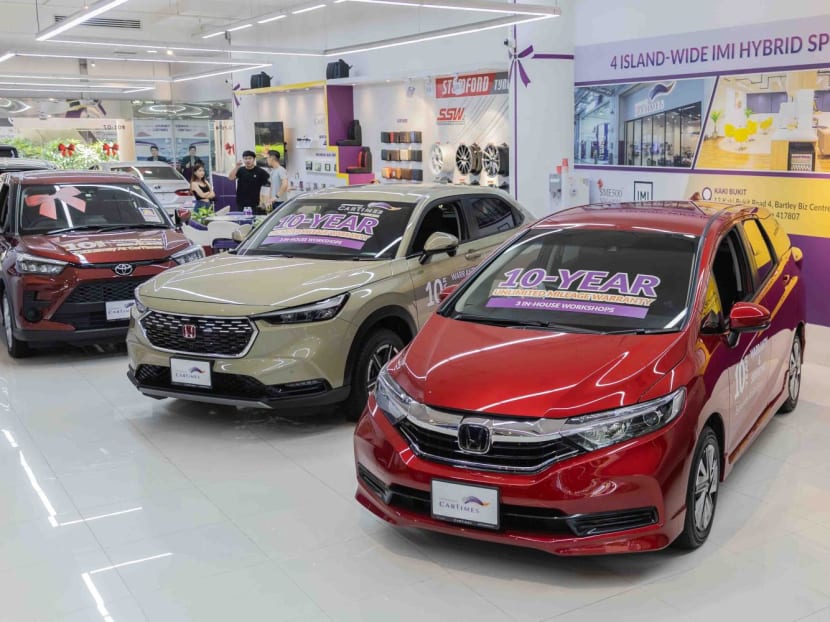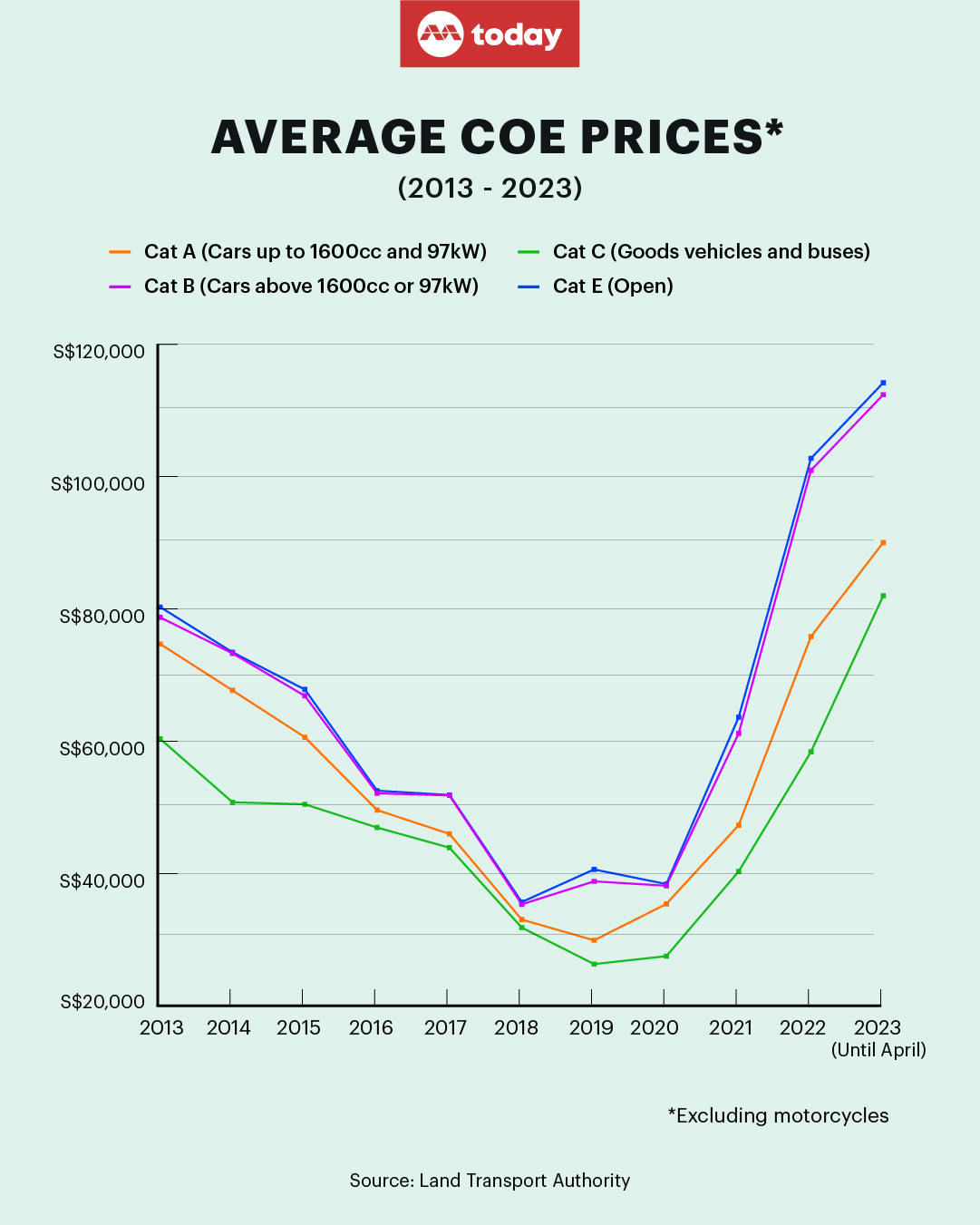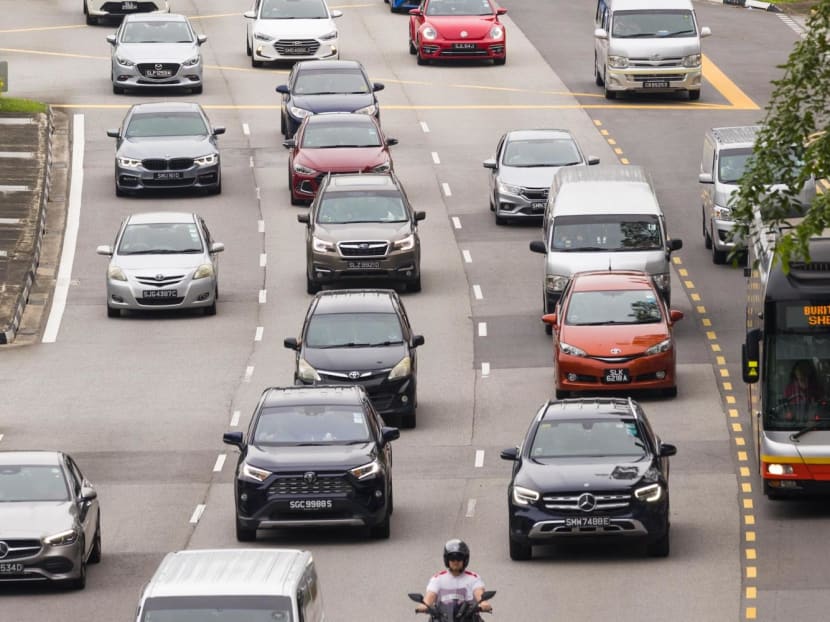The Big Read in short: Should COE system be tweaked amid record prices?
SINGAPORE — Before the Certificate of Entitlement (COE) bidding exercise was suspended in April 2020 due to the circuit breaker imposed back then, prices for some of the categories were at levels that would not be seen again since.

CarTimes Automobile’s showroom at 61 Ubi Ave 2 on April 23, 2023.
Each week, TODAY’s long-running Big Read series delves into the trends and issues that matter. This week, we look at the record-high Certificate of Entitlement (COE) prices, and whether this signals a need to review the vehicle quota system. This is a shortened version of the full feature, which can be found here.
- Certificate of Entitlement (COE) prices for cars have been setting new records in recent weeks, causing much angst among aspiring car-owners
- With this, perennial questions over the merits and limitations of the system — such as whether it is working as intended, or needs an overhaul altogether — have been raised by motorists and transport experts alike
- Experts agree that while the system is meant to curb vehicular growth, more can be done to ensure that COE prices are less volatile
- They also weigh in on different suggestions on how to tweak the system
- These include reintroducing a category for mass market cars and imposing a tax on those who buy more than one car
SINGAPORE — Before the Certificate of Entitlement (COE) bidding exercise was suspended in April 2020 due to the circuit breaker imposed back then, prices for some of the categories were at levels that would not be seen again since.
In March that year, COE premiums for small cars (up to 1,600cc & 97kW), or fully electric cars with output of up to 110kW, were at S$31,210, while premiums for large cars (above 1,600cc or 97kW), or fully electric cars with output over 110kW, cost S$30,012.
This was a far cry from the prices at the most recent COE bidding result on April 19 this year, where premiums for small cars, or Category A, shot up for the first time past the S$100,000 mark to S$103,721. COE prices for large cars under Category B also rose to S$120,889.
Both these categories set new records for the third round running, causing shock and dismay to some motorists, such as Mr Isaac Tan.
The 31-year-old had bought a second-hand Honda Stream in 2017 near the end of its COE's 10-year validity, and so had to renew the certificate at the end of 2018.
Back then, COE prices for Category A cars like his were at about S$32,000. However, he had been juggling part-time work with his studies back then, and so did not have sufficient savings to foot the cost of the entire COE.
So, he made the fateful decision to extend the car’s COE by five years, instead of 10, and paid only about S$16,000 for it.
Now, with COE prices at record highs, he looked back at that decision with regret.
“I was thinking that we might hit another bottom again. I was looking at the five and 10-year cycles of lows and highs, and by right, this year was supposed to be a low year,” the interior designer said.
Now, he has only six months of COE validity left on his car.
As he believes that COE prices are unlikely to fall anytime soon, Mr Tan is in two minds about buying a new car, as it would cost over three times the value of a COE in 2018.
He added that this dilemma applies particularly to his family, as he and his wife had just welcomed a baby girl into the family late last year, making public transport a relatively inconvenient option.


WHY IT MATTERS
Mr Tan is among a growing group of young prospective car buyers who are finding it increasingly difficult to realise their dreams of owning a car due to the high COE prices.
With COE records being broken every fortnight, perennial questions over the merits and limitations of the system — such as whether it is working as intended, or needs an overhaul altogether — have been raised by motorists and transport experts alike.
The COE system, which will be exactly 33 years old on Monday (May 1), was set up to control the vehicle population in a small and densely populated country, and has been associated for years with higher car prices.
No doubt, steps have been taken to address the issue of high and volatile prices, with several changes made to the COE system over the past few years to reduce the quarter-on-quarter volatility of COE supply.
However, the fact remains that car prices here still remain astronomical compared to the rest of the world.
Member of Parliament Lim Biow Chuan, who sits on the Government Parliamentary Committee for transport, said that ultimately, aspiring car owners need to recognise that it is difficult to allow everyone to own a car in Singapore.
“This would mean massive congestion on the roads, like what we see in other major cities."
He added said that while many do perceive a car to be the most convenient transport mode, the fact is that Land Transport Authority (LTA) has also taken measures to ensure that public transport remains affordable and accessible, and is encouraging more people to take public transport or even cycle to reduce their carbon footprint.
“All these measures will take time to be effective and I think we should allow these policies to have greater impact in the mid and longer term."
THE BIG PICTURE
Experts agreed that the supply of COEs has to be smoothened out so that pricing is more moderate and stable over a longer period of time.
Economist Walter Theseira said that the 10-year cycle of COEs “badly distorts” the automobile market and causes these fluctuations.
For instance, he argued that the 10-year validity, along with the five or 10-year extension option, will mean that vehicle renewals will happen only at the 10, 15 or 20- year mark for most vehicles.
There is “no particular reason” why consumers should behave this way, “especially since the average duration a vehicle is kept for will change over time, due to technology or engineering”, said the associate professor from the Singapore University of Social Sciences.
“It means that consumers can't respond to technological advances in the car industry, such as electrification, which has greatly improved the safety, power and efficiency of cars today compared to even just five years ago.”
He added that one of the hallmarks of the 10-year cycle means that the supply of COEs is highly volatile, even despite the Government’s efforts last year to smoothen the curve.
“What needs to happen over the entire 10-year cycle is to smooth out COE supply properly across the years, otherwise, you have no real impact on the trend because the low COE era continues for years at a time, not just months,” he said.
Mr Eddie Loo, managing director of CarTimes Automobile, noted that due to the current low supply, the limited quota of cars are going mostly to those who have the money to buy them, rather than those who need the vehicles the most, such as Mr Tan and his young family.
He said that as the pandemic subsided, the percentage of “super rich” customers could afford to pay upfront for the vehicle without loans, had risen from 10 per cent to about 40 per cent, which he attributed to more foreigners coming to Singapore as borders reopened.
THE BOTTOMLINE
While the COE system is intended mainly to control the car population rather than to make cars affordable, some young Singaporeans feel that the system should also not work against those who need cars the most.
They also feel that the COE system allows the rich to outbid the average consumer, hence making cars less accessible to the masses.
Tech entrepreneur Clinton Teh said that given the large premiums Singaporeans pay for cars, some drivers tend to see it as more than just a pragmatic way to get around.
“Singaporeans have a very emotional attachment to cars, not just as a form of transport, but as a status symbol,” said the 31-year-old.

A 2019 study, conducted by researchers from the National University of Singapore (NUS) and Nanyang Technological University, showed that people who bought cars when COEs were high tended to use their cars more.
“Our interpretation of the behaviour is that (drivers) felt that, having spent so much money, they ought to make full use of their cars,” said Distinguished Professor Ivan Png from the School of Business and Departments of Economics and Information Systems and Analytics at NUS, who was part of the study.
He told TODAY that COEs are “a very crude way” of managing congestion and emissions and "controlling usage is the correct way”.
Prof Png said that while the Electronic Road Pricing (ERP) system seeks to control usage, it could be improved. He noted that the authorities had planned to introduce a satellite-based ERP system, but that it had been continually delayed.
LTA had said in 2021 that the new ERP system would be delayed for at least one-and-a-half years owing to the worsening global shortage of microchips.
Amid the eye-watering COE prices recently, there has been no shortage of suggestions from motorists and car dealers on how to improve the system.
These range from imposing additional costs on those who buy more than one car to putting a cap on the private-hire vehicle fleet and changing the COE categorisation of cars to ensure the average bidder does not compete with higher-end buyers.
However, not all the suggestions are feasible and some have implications that will require further studies, experts said.











